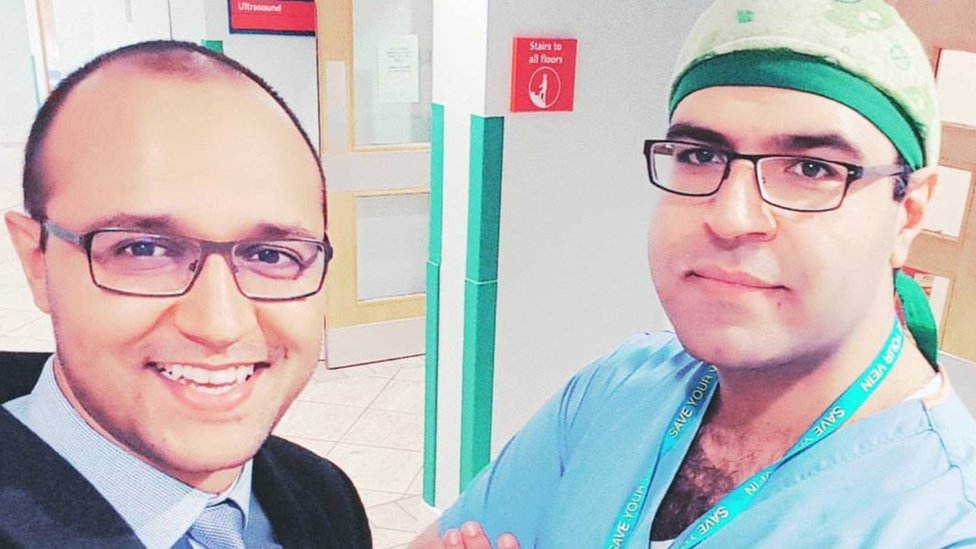INSUBCONTINENT EXCLUSIVE:
Image copyrightSaied FroghiImage caption
Saied Froghi, right, with his brother Farid Froghi, a surgery research fellow,
who joked "all those years of gaming paid off"
Trainee surgeon Saied Froghi played video games like Age of Empires and Halo
in his spare time during medical school.But rather than impede his learning, he believes the time he spent in front of a screen has actually
helped his surgery skills.He's one of a number of doctors and health professionals who disagree with a professor of surgery who claims
medical students are losing manual dexterity because they are spending too much time "swiping".In fact, video games can improve your manual
dexterity, sharpen your reaction time, and train you to focus on specific tasks, they say.And gaming can even act as a good "warm up"
exercise for surgeons too, it's claimed.'Move left to move right'For Saied, playing games helped him with his concentration."If you take
the example of keyhole surgery, your eyes focus on a screen and your hands move synchronously with what you are doing," he said."That's a
similar scenario to when you are playing football with a games console
Your hands know where the buttons are and how to rotate the instrument."Image copyrightGetty ImagesFor Rajin Chowdhury, a registrar in
anaesthetic and intensive care at Sheffield Teaching Hospital, gaming has helped make him "more dextrous".Video games, he said, improved
hand-eye coordination, and many procedures are performed remotely through looking at a screen."For example in an appendicectomy, because of
the way the camera is inserted in the abdomen, when you move it down [in the body] you move it up on the image
When I want to move right you have to move it left
"It's not intuitive."'Texters react faster'Physiotherapist Ashley James said there is "very, very little evidence" to suggest the
widespread use of smartphones by students affects their manual dexterity."There's not that research out there," he said
"I'm not saying he [Professor Kneebone] doesn't have a point, but the likelihood is the authority and certainty of which he speaks is
probably not based on fact or any evidence."Mr James pointed to a study of 100 medical students, half of whom were frequent mobile phone
texters, and half light users."The researchers didn't find anything different in terms of dexterity," says Mr James
"But another thing they tested in that study was reaction time
"Mobile phone frequent texters had improved reaction time."He added: "It's just one small study
I wouldn't hang my hat on it but I wouldn't be as forthright on my conclusion as the surgeon is."'Skills can be taught'One consultant
surgeon in Leeds tweeted a story he was told of how a junior doctor got the job done during an operation, citing his Nintendo skills as a
help.Meanwhile Susan Hill, vice president of the Royal College of Surgeons, said: "I have not noticed any great difference in the dexterity
of the medical students or junior doctors I come into contact with, when compared to other generations
"In fact, I can recall finding some surgical techniques extremely difficult to master myself even though I trained well before the IT
revolution," she said."Although it may be useful for a surgeon to be naturally dexterous, the skills required to operate can be taught
Much of surgical training is about practising skills such as cutting and sewing over and over until they are perfected."It's also worth
recognising that some of the skills individuals pick up from their time on screen can be useful to their work as surgeons
We're already seeing the beginnings of a future where a surgeon's ability to interact with technology, be that surgical robots or
augmented reality, will become increasingly important."Practice makes perfectProfessor Steve Wigmore, a professor of surgery from the
University of Edinburgh, said research is showing that playing computer games "is a good warm up" to performing keyhole, or laparoscopic
surgery."I think the quality of the trainees is down to the quality of the training," he said.NHS surgeon and surgery professor Peter
Brennan is the chairman of the MRCS exam for the UK and Ireland - the exam which junior doctors need to pass to become surgeons
He said: "We are not going to let people pass that exam if we don't think they have the skills".And he added medical students who want to
become surgeons often may choose that career path because they are "good with their hands".Many surgeons said practice is one of the top
ways to improve their stitching and suturing skills - a rule which applies for both the current medical students - and older generations.As
surgeon Mr Froghi joked, as the doctors of today get older, "do you think gardening will contribute to the acquisition and maintenance of

